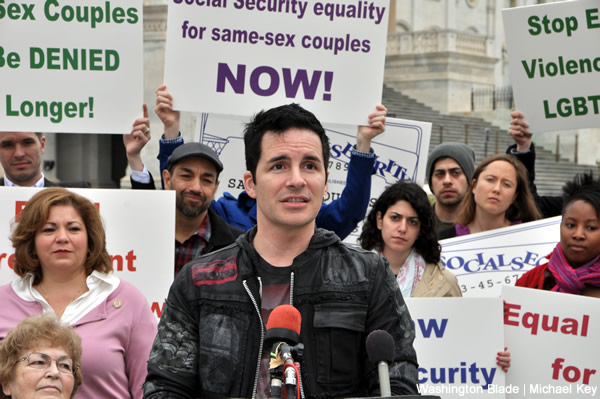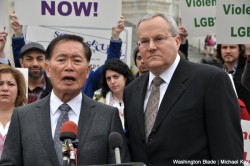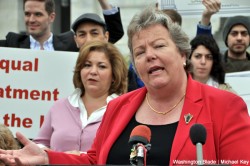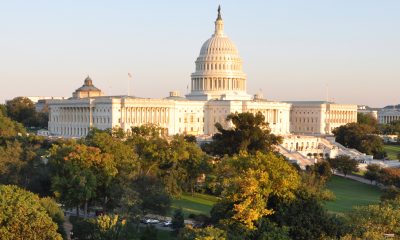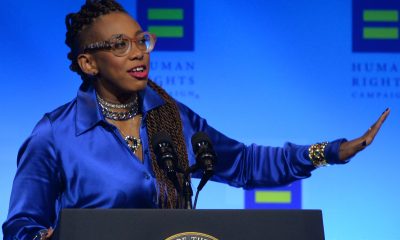National
Hollywood comes to Capitol Hill to push for Social Security bill
Legislation would allow gay couples to access benefits
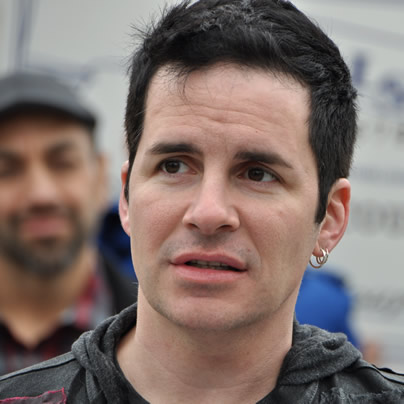
A Los Angeles congresswoman beamed in support from Hollywood on Thursday to spread the word about legislation she introduced in the U.S. House to end inequities that same-sex couples face in the Social Security system.
During a news conference on Capitol Hill, Rep. Linda Sánchez (D-Calif.) said her legislation, the Social Security Equality Act, would allow gay families to gain access to the same survivor and pension benefits available to opposite-sex couples.
“The gay and lesbian population will not be told by their government that they are second-class citizens,” Sánchez said. “Same-sex couples pay into Social Security — they should receive the full benefits they have earned.”
Sánchez’s bill, H.R. 4609, would eliminate the Social Security Administration policy denying same-sex couples benefits. According to Sánchez, gay male couples receive 18 percent less in Social Security benefits than straight couples, while lesbian couples receive 31 percent less because women statistically earn less money.
Four types of Social Security benefits are denied to same-sex couples: spousal retirement benefits after one spouse retires; disability benefits if one spouse becomes disabled; survivor’s benefits, which allow surviving spouses to claim either their own Social Security benefit or an amount equal to the compensation that would have been afforded to their deceased spouse; and the death benefit, which provides for burial expenses.
The legislation, which was previously introduced in 2010, has 95 co-sponsors: all Democrats. The four openly gay members of Congress — Reps. Barney Frank (D-Mass.), Tammy Baldwin (D-Wis.), Jared Polis (D-Colo.) and David Cicilline (D-R.I.) — have all signed on in support.
Celebrities appeared at the news conference to advocate for the legislation alongside the lawmakers and LGBT advocates. Supporters carried signs reading “Outlaw Social Security Discrimination” and “Stop Economic Violence Against LGBT Seniors.” One sign was a mock Social Security card with “same-sex couples” written in the line allotted for a name.
George Takei, famed for his role as “Mr. Sulu” in the “Star Trek” series, appeared with his spouse, Brad Altman, and decried the hardship that same-sex couples face because of inequities in the Social Security system as “unfair and unjust.”
“There are same-sex couples who are denied equality often when misfortune befalls same-sex couples,” Takei said. “One falls ill, or tragically one might pass away. A survivor is left not only grieving, but financially insecure — and often the home they’ve built together, shared together is lost.”
Hal Sparks, known for his role as “Michael” in Showtime’s “Queer as Folk,” also spoke out against the current system for putting LGBT seniors in a position that is “not only emotionally difficult, but financially or physically dangerous.”
“It is odd for me, at this very moment, that as the law stands, I have rights that many of the people who are standing behind me, to my right and my left, do not have,” Sparks said. “If the law is not changed, they are headed toward a future that is more limited, more fractured and, quite frankly, more dangerous than mine.”
Another speaker at the event felt the discrimination under the current Social Security system firsthand. Alice Herman, from Los Angeles, a spokesperson for the grassroots group “Rock for Equality,” talked about the difficulties she faced after losing Sylvia, her partner of 45 years.
Even though both had paid into Social Security for more than 50 years, Herman at the age of 73 wasn’t able to receive survivor benefits following the death of her partner, who had a greater income. While Herman was a social worker, her partner worked in business and climbed the corporate ladder.
“When she died, much to my amazement, Social Security denied me the death benefit, then Social Security refused to provide me with the survivor’s benefit,” Herman said. “These denials came even though we were legally married. They dismissed our 45 together, our 45 years of love and commitment, our 45 years of contributing to society as meaningless.”
Had she been able to receive these benefits, Herman said she would have been able to stay in her home. However, she was forced to find another place to live because the only other option would be living in her car.
LGBT advocates also railed against the Social Security system for not providing gay couples the same benefits as others.
Lorri Jean, CEO of the L.A. Gay & Lesbian Center, said same-sex couples pay into Social Security with every paycheck, but are unable to reap the full benefits of the system.
“Every single month, the L.A. Gay & Lesbian Center provides programs and services to thousands of lesbian, gay, bisexual and transgender seniors,” Jean said. “Too many come because they have been denied Social Security benefits.”
Rea Carey, executive director of the National Gay & Lesbian Task Force, commended Sanchez for introducing the legislation and emphasized Social Security’s effectiveness at being “one of the most successful anti-poverty programs in the nation’s history.”
“The Social Security Equality Act begins to give same-sex couples the dignity they deserve and the financial security they desperately need,” Carey said. “In a time of flat income for most Americans and disappearing pensions, it is absolutely vital for the government to protect our most vulnerable.”
Michael Adams, executive director of Services & Advocacy for GLBT Elders, or SAGE, also stressed the need for the bill as a way to help LGBT elders.
“Whether it’s our LGBT community or our community as a whole, our elders are our pioneers,” Adams said. “They are the people who led the way for us, and the fact that in 2012, we are still having this argument over whether LGBT elders would be treated with dignity and respect and tolerance is outrageous.”
Adams said most seniors rely on Social Security for at least half of their retirement income, and LGBT elders need Social Security even more because they’re more likely to be living in poverty than opposite-sex couples. Additionally, Adams said LGBT elders are more likely to live single in their old age, and one-third of single elders rely on Social Security for their entire retirement income.
Despite the push by advocates, movement in the Republican-controlled House is unlikely. Nonetheless, Sánchez said she’s hopeful the legislation will receive a hearing in the House Ways & Means Committee, which will have jurisdiction over the bill.
Sánchez said she hasn’t had the opportunity to have a conversation with Chairman Dave Camp (R-Mich.) about the bill because it has just been introduced, but said “that conversation will be taking place in the near future.” The Ways & Means Committee didn’t respond to a request for comment on the measure.
The legislation is being introduced relatively late in the 112th Congress compared to other LGBT bills, which were introduced at the start of last year. Sánchez said the bill was being introduced at this time because “there were certain legislative nuances to the bill that we had to work out.”
Advocates at the news conference also said talks were underway about a Senate companion, although no one would identify any potential Senate sponsors or give an estimate on when the legislation would be introduced.
It’s unclear whether the bill would be necessary if the Defense of Marriage Act, which prohibits federal recognition of same-sex couples, were overturned, or if further revision would be needed after DOMA is lifted to ensure same-sex couples are eligible for Social Security benefits.
Sánchez said she wants to push for DOMA repeal as she advocates for the Social Security Equality Act.
“Ultimately, DOMA is an issue that we have to deal with, and the preferable route would be to repeal DOMA,” Sánchez said. “But this is one step we can make on the path to making that happen and we’re hoping that if we get the support that we need and the grassroots to have this legislation pass — because it’s such a clear case of economic discrimination — then that undermines the arguments in DOMA.”
Jean talked about the need to overturn DOMA at the same time she pushed for passage of the new legislation.
“Of course, we still need to repeal the Defense of Marriage Act and ensure that same-sex couples are given all of the rights that are straight brothers and sisters enjoy,” Jean said. “But until that day, the Social Security Equality Act will make a crucial difference to countless elderly people.”
The White House
Four states to ignore new Title IX rules protecting transgender students
Biden administration last Friday released final regulations

BY ERIN REED | Last Friday, the Biden administration released its final Title IX rules, which include protections for LGBTQ students by clarifying that Title IX forbids discrimination based on sexual orientation and gender identity.
The rule change could have a significant impact as it would supersede bathroom bans and other discriminatory policies that have become increasingly common in Republican states within the U.S.
As of Thursday morning, however, officials in at least four states — Oklahoma, Louisiana, Florida, and South Carolina — have directed schools to ignore the regulations, potentially setting up a federal showdown that may ultimately end up in a protracted court battle in the lead-up to the 2024 elections.
Louisiana State Superintendent of Education Cade Brumley was the first to respond, decrying the fact that the new Title IX regulations could block teachers and other students from exercising what has been dubbed by some a “right to bully” transgender students by using their old names and pronouns intentionally.
Asserting that Title IX law does not protect trans and queer students, Brumley states that schools “should not alter policies or procedures at this time.” Critically, several courts have ruled that trans and queer students are protected by Title IX, including the 4th U.S. Circuit Court of Appeals in a recent case in West Virginia.
In South Carolina, Schools Supt. Ellen Weaver wrote in a letter that providing protections for trans and LGBTQ students under Title IX “would rescind 50 years of progress and equality of opportunity by putting girls and women at a disadvantage in the educational arena,” apparently leaving trans kids out of her definition of those who deserve progress and equality of opportunity.
She then directed schools to ignore the new directive while waiting for court challenges. While South Carolina does not have a bathroom ban or statewide “Don’t Say Gay or Trans” law, such bills continue to be proposed in the state.
Responding to the South Carolina letter, Chase Glenn of Alliance For Full Acceptance stated, “While Supt. Weaver may not personally support the rights of LGBTQ+ students, she has the responsibility as the top school leader in our state to ensure that all students have equal rights and protections, and a safe place to learn and be themselves. The flagrant disregard shown for the Title IX rule tells me that our superintendent unfortunately does not have the best interests of all students in mind.”
Florida Education Commissioner Manny Diaz also joined in instructing schools not to implement Title IX regulations. In a letter issued to area schools, Diaz stated that the new Title IX regulations were tantamount to “gaslighting the country into believing that biological sex no longer has any meaning.”
Governor Ron DeSantis approved of the letter and stated that Florida “will not comply.” Florida has notably been the site of some of the most viciously anti-queer and anti-trans legislation in recent history, including a “Don’t Say Gay or Trans” law that was used to force a trans female teacher to go by “Mr.”
State Education Supt. Ryan Walters of Oklahoma was the latest to echo similar sentiments. Walters has recently appointed the right-wing media figure Chaya Raichik of Libs of TikTok to an advisory role “to improve school safety,” and notably, Raichik has posed proudly with papers accusing her of instigating bomb threats with her incendiary posts about LGBTQ people in classrooms.
The Title IX policies have been universally applauded by large LGBTQ rights organizations in the U.S. Lambda Legal, a key figure in fighting anti-LGBTQ legislation nationwide, said that the regulations “clearly cover LGBTQ+ students, as well as survivors and pregnant and parenting students across race and gender identity.” The Human Rights Campaign also praised the rule, stating, “rule will be life-changing for so many LGBTQ+ youth and help ensure LGBTQ+ students can receive the same educational experience as their peers: Going to dances, safely using the restroom, and writing stories that tell the truth about their own lives.”
The rule is slated to go into effect Aug. 1, pending any legal challenges.
****************************************************************************

Erin Reed is a transgender woman (she/her pronouns) and researcher who tracks anti-LGBTQ+ legislation around the world and helps people become better advocates for their queer family, friends, colleagues, and community. Reed also is a social media consultant and public speaker.
******************************************************************************************
The preceding article was first published at Erin In The Morning and is republished with permission.
Pennsylvania
Malcolm Kenyatta could become the first LGBTQ statewide elected official in Pa.
State lawmaker a prominent Biden-Harris 2024 reelection campaign surrogate

Following his win in the Democratic primary contest on Wednesday, Pennsylvania state Rep. Malcolm Kenyatta, who is running for auditor general, is positioned to potentially become the first openly LGBTQ elected official serving the commonwealth.
In a statement celebrating his victory, LGBTQ+ Victory Fund President Annise Parker said, “Pennsylvanians trust Malcolm Kenyatta to be their watchdog as auditor general because that’s exactly what he’s been as a legislator.”
“LGBTQ+ Victory Fund is all in for Malcolm, because we know he has the experience to win this race and carry on his fight for students, seniors and workers as Pennsylvania’s auditor general,” she said.
Parker added, “LGBTQ+ Americans are severely underrepresented in public office and the numbers are even worse for Black LGBTQ+ representation. I look forward to doing everything I can to mobilize LGBTQ+ Pennsylvanians and our allies to get out and vote for Malcolm this November so we can make history.”
In April 2023, Kenyatta was appointed by the White House to serve as director of the Presidential Advisory Commission on Advancing Educational Equity, Excellence and Economic Opportunity for Black Americans.
He has been an active surrogate in the Biden-Harris 2024 reelection campaign.
The White House
White House debuts action plan targeting pollutants in drinking water
Same-sex couples face higher risk from environmental hazards

Headlining an Earth Day event in Northern Virginia’s Prince William Forest on Monday, President Joe Biden announced the disbursement of $7 billion in new grants for solar projects and warned of his Republican opponent’s plans to roll back the progress his administration has made toward addressing the harms of climate change.
The administration has led more than 500 programs geared toward communities most impacted by health and safety hazards like pollution and extreme weather events.
In a statement to the Washington Blade on Wednesday, Brenda Mallory, chair of the White House Council on Environmental Quality, said, “President Biden is leading the most ambitious climate, conservation, and environmental justice agenda in history — and that means working toward a future where all people can breathe clean air, drink clean water, and live in a healthy community.”
“This Earth Week, the Biden-Harris Administration announced $7 billion in solar energy projects for over 900,000 households in disadvantaged communities while creating hundreds of thousands of clean energy jobs, which are being made more accessible by the American Climate Corps,” she said. “President Biden is delivering on his promise to help protect all communities from the impacts of climate change — including the LGBTQI+ community — and that we leave no community behind as we build an equitable and inclusive clean energy economy for all.”
Recent milestones in the administration’s climate policies include the U.S. Environmental Protection Agency’s issuance on April 10 of legally enforceable standard for detecting and treating drinking water contaminated with polyfluoroalkyl substances.
“This rule sets health safeguards and will require public water systems to monitor and reduce the levels of PFAS in our nation’s drinking water, and notify the public of any exceedances of those levels,” according to a White House fact sheet. “The rule sets drinking water limits for five individual PFAS, including the most frequently found PFOA and PFOS.”
The move is expected to protect 100 million Americans from exposure to the “forever chemicals,” which have been linked to severe health problems including cancers, liver and heart damage, and developmental impacts in children.
An interactive dashboard from the United States Geological Survey shows the concentrations of polyfluoroalkyl substances in tapwater are highest in urban areas with dense populations, including cities like New York and Los Angeles.
During Biden’s tenure, the federal government has launched more than 500 programs that are geared toward investing in the communities most impacted by climate change, whether the harms may arise from chemical pollutants, extreme weather events, or other causes.
New research by the Williams Institute at the UCLA School of Law found that because LGBTQ Americans are likelier to live in coastal areas and densely populated cities, households with same-sex couples are likelier to experience the adverse effects of climate change.
The report notes that previous research, including a study that used “national Census data on same-sex households by census tract combined with data on hazardous air pollutants (HAPs) from the National Air Toxics Assessment” to model “the relationship between same-sex households and risk of cancer and respiratory illness” found “that higher prevalence of same-sex households is associated with higher risks for these diseases.”
“Climate change action plans at federal, state, and local levels, including disaster preparedness, response, and recovery plans, must be inclusive and address the specific needs and vulnerabilities facing LGBT people,” the Williams Institute wrote.
With respect to polyfluoroalkyl substances, the EPA’s adoption of new standards follows other federal actions undertaken during the Biden-Harris administration to protect firefighters and healthcare workers, test for and clean up pollution, and phase out or reduce use of the chemicals in fire suppressants, food packaging, and federal procurement.
-

 District of Columbia3 days ago
District of Columbia3 days agoCatching up with the asexuals and aromantics of D.C.
-

 State Department5 days ago
State Department5 days agoState Department releases annual human rights report
-

 South America3 days ago
South America3 days agoArgentina government dismisses transgender public sector employees
-

 Maine4 days ago
Maine4 days agoMaine governor signs transgender, abortion sanctuary bill into law

